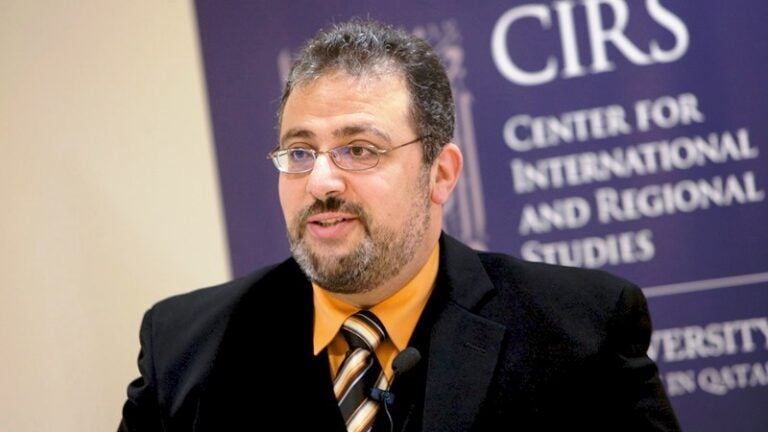Dialogue Series, Distingushed Lectures, Race & Society, Regional Studies
Part 1: Imam Yahya Hendi's Journey with Islam

Imam Yahya Hendi delivered a two-part CIRS Focused Discussionseries taking the audience on “A Journey with Islam in the 21st Century.” The lectures were co-sponsored and hosted by the Museum of Islamic Art in Doha. The first lecture took place on April 18, 2011, and focused on “The Paradigms of Islamic Ethics, Human Rights, and Social Justice,” where Hendi examined the religious roots of social justice in the Qur’an.
He argued that since Islam’s main goal is to bring about peace and social justice to the world, there is a prominent theme that calls for the welfare of all within society with a particular focus on the poor and vulnerable. Hendi said that themes of benevolence and social democracy are often forgotten or even belittled by Muslims who have interpreted the text to suit their own political agendas. “I challenge Muslims, asking them to produce, what I call, a new agenda of how they speak about Islam and how they understand Islam in a way that preserves the authenticity of the text and the authenticity of the essence of faith and yet allow themselves to question and ask tough questions,” he said.
Although the past should be respected, contemporary socio-political challenges and the needs of the moment should be respected as well in order to deal with these new realities. Muslims, Hendi said, need to be honest in the critique of the negative aspects of their communities, rather than fear backlash. Historically, communal knowledge, public practice, and debating known as “’urf” was considered to be a valuable source of Islamic ethics that was consensual and agreed upon by members of the public or Umma. However, more recently, Islamic ethicists and scholars have tried to exclude social contributions to Islamic knowledge by claiming sole authority in such matters. “We need to have ethical teachings that are realistic, that deal with reality, and that actually can be practiced,” in order for ethics to be an attainable and manageable concept that is performed by all. Indeed, the Imam said, “Islamic ethics honors the concept of ‘wajib’ and tells us about our responsibilities – both personal and public.”
Imam Hendi is the Muslim chaplain at Georgetown University, the first American University to hire a full-time Muslim chaplain. Imam Hendi is also the Muslim Chaplain at the National Naval Medical Center in Bethesda, MD. He has written numerous publications on many topics, including women in Islam, women and gender relations in Islam, the second coming of the Messiah, Islam and biomedical ethics and religion and Islam in the United States.
Read about Part 2 of the Imam’s lecture series.
Article by Suzi Mirgani, CIRS Publications Coordinator